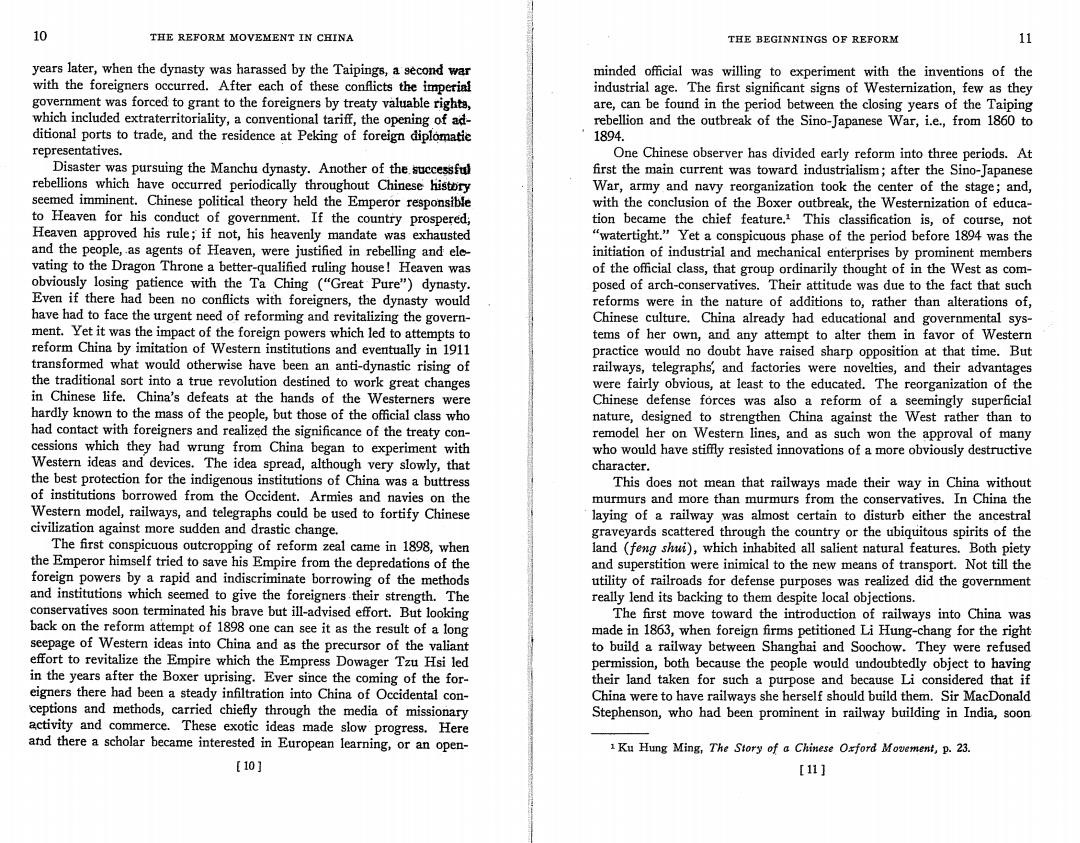正在加载图片...

10 THE REFORM MOVEMENT IN CHINA THE BEGINNINGS OF REFORM 11 years later,when the dynasty was harassed by the Taipings,a second war minded official was willing to experiment with the inventions of the with the foreigners occurred.After each of these conflicts the imperial industrial age.The first significant signs of Westernization,few as they government was forced to grant to the foreigners by treaty valuable righta, are,can be found in the period between the closing years of the Taiping which included extraterritoriality,a conventional tariff,the opening of ad- rebellion and the outbreak of the Sino-Japanese War,i.e.,from 1860 to ditional ports to trade,and the residence at Peking of foreign diplomatie 1894. representatives. One Chinese observer has divided early reform into three periods.At Disaster was pursuing the Manchu dynasty.Another of the successful first the main current was toward industrialism;after the Sino-Japanese rebellions which have occurred periodically throughout Chinese history War,army and navy reorganization took the center of the stage;and, seemed imminent.Chinese political theory held the Emperor responsible with the conclusion of the Boxer outbreak,the Westernization of educa- to Heaven for his conduct of government.If the country prospered, tion became the chief feature.This classification is,of course,not Heaven approved his rule;if not,his heavenly mandate was exhausted "watertight."Yet a conspicuous phase of the period before 1894 was the and the people,as agents of Heaven,were justified in rebelling and ele- initiation of industrial and mechanical enterprises by prominent members vating to the Dragon Throne a better-qualified ruling house!Heaven was of the official class,that group ordinarily thought of in the West as com- obviously losing patience with the Ta Ching ("Great Pure")dynasty. posed of arch-conservatives.Their attitude was due to the fact that such Even if there had been no conflicts with foreigners,the dynasty would reforms were in the nature of additions to,rather than alterations of, have had to face the urgent need of reforming and revitalizing the govern- Chinese culture.China already had educational and governmental sys- ment.Yet it was the impact of the foreign powers which led to attempts to tems of her own,and any attempt to alter them in favor of Western reform China by imitation of Western institutions and eventually in 1911 practice would no doubt have raised sharp opposition at that time.But transformed what would otherwise have been an anti-dynastic rising of railways,telegraphs,and factories were novelties,and their advantages the traditional sort into a true revolution destined to work great changes were fairly obvious,at least to the educated.The reorganization of the in Chinese life.China's defeats at the hands of the Westerners were Chinese defense forces was also a reform of a seemingly superficial hardly known to the mass of the people,but those of the official class who nature,designed to strengthen China against the West rather than to had contact with foreigners and realized the significance of the treaty con- remodel her on Western lines,and as such won the approval of many cessions which they had wrung from China began to experiment with who would have stiffly resisted innovations of a more obviously destructive Western ideas and devices.The idea spread,although very slowly,that character. the best protection for the indigenous institutions of China was a buttress This does not mean that railways made their way in China without of institutions borrowed from the Occident.Armies and navies on the murmurs and more than murmurs from the conservatives.In China the Western model,railways,and telegraphs could be used to fortify Chinese laying of a railway was almost certain to disturb either the ancestral civilization against more sudden and drastic change. graveyards scattered through the country or the ubiquitous spirits of the The first conspicuous outcropping of reform zeal came in 1898,when land (fexg shui),which inhabited all salient natural features.Both piety the Emperor himself tried to save his Empire from the depredations of the and superstition were inimical to the new means of transport.Not till the foreign powers by a rapid and indiscriminate borrowing of the methods utility of railroads for defense purposes was realized did the government and institutions which seemed to give the foreigners their strength.The really lend its backing to them despite local objections. conservatives soon terminated his brave but ill-advised effort.But looking The first move toward the introduction of railways into China was back on the reform attempt of 1898 one can see it as the result of a long made in 1863,when foreign firms petitioned Li Hung-chang for the right seepage of Western ideas into China and as the precursor of the valiant to build a railway between Shanghai and Soochow.They were refused effort to revitalize the Empire which the Empress Dowager Tzu Hsi led permission,both because the people would undoubtedly object to having in the years after the Boxer uprising.Ever since the coming of the for- their land taken for such a purpose and because Li considered that if eigners there had been a steady infiltration into China of Occidental con- China were to have railways she herself should build them.Sir MacDonald ceptions and methods,carried chiefly through the media of missionary Stephenson,who had been prominent in railway building in India,soon activity and commerce.These exotic ideas made slow progress.Here anad there a scholar became interested in European learning,or an open- 1Ku Hung Ming,The Story of a Chinese Orford Movement,p.23. 【10] [11]